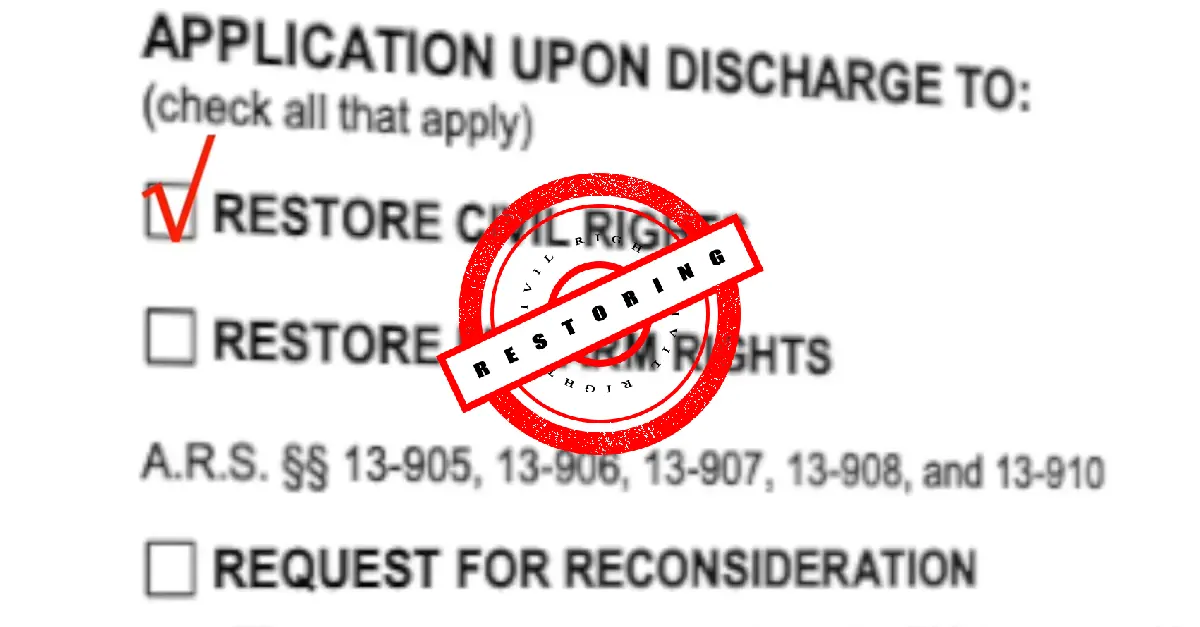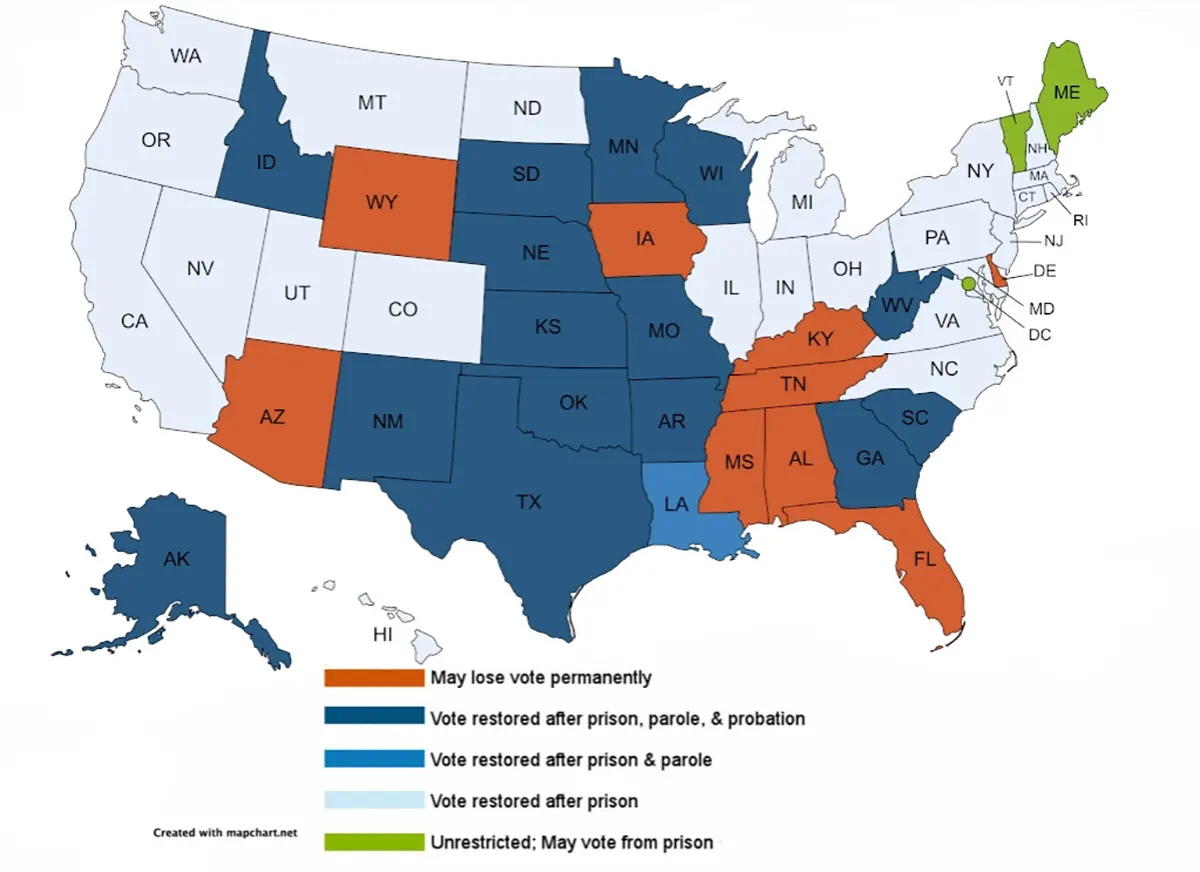A felony conviction is a heavy burden to carry. Not only are you stripped off of several rights, but you are also condemned to suffer in society, especially when finding jobs. However, do convicted felons still have the right to run for public office?
Felons can run for public office as long as there is no law that explicitly says they can’t. For instance, there are some federal states that ban felons from running, like Texas and Florida.
However, as a convicted felon aspiring for a public position, bear in mind that the journey will be thrice as hard for you. People will look at you differently, and you have to take it. Nonetheless, it is still possible.
Here’s everything you need to know about running for public office with a felony conviction:
Quick Navigation
- Requirements to Hold Public Office
- Restoring Civil Rights
- How to Run for Public Office with Felony Convictions
- What States Ban Felons from Running for Public Office?
- Conclusion
Requirements to Hold Public Office
As mentioned, whether or not a felon can run for office differs from one state to another.
Some states allow this completely. Other states give a chance to those with a felony conviction that’s 10 years old or older. Some completely ban anyone with a criminal conviction from holding office, most especially, if the crime involves deceit, fraud, poorly managing public funds intentionally, and so on.
With that said, there are two types of requirements you should take note of if you want to run for the election – general qualifications and federal requirements. The general qualifications are what’s required by anyone and everyone running for any position.
Common General Qualifications:
- You must be a full-time or primary resident of the district.
- You must have lived in the district for a specific amount of time.
- You must meet the age requirement (if any)
- You must meet other qualifications such as needing to be a registered lawyer to run for legal office and so on.
Whereas the federal requirements differ depending on the state office you’re running for. For example, the federal standard to run for Congress and President are not the same.
To run for Congress, you have to be a US citizen for at least 7 years and beyond 25 years old. To run as president, you have to be a natural-born citizen, a US resident for at least 14 years, and 35 years old and above.
Restoring Civil Rights
Although a person convicted of a felony can still get elected, the loss of civil rights still heavily affects your ability to hold office. Hence, felons must have their civil rights restored before their service.

Here’s a quick list of some of the consequences of being a convicted felon:
- Loss of voting rights
- Deprivation from obtaining commercial driver’s licenses
- Temporary or permanent loss of public housing
- Loss of rights to own a firearm
- Loss of child custody
- Employment denial
The consequences you will face will depend on the type of felony you did and its severity. In order to restore your civil rights, you first have to complete your sentence including probation. You must also not have any other outstanding criminal charges, otherwise, this will affect your plea.
As long as these two are met, then you can apply for clemency which will restore the rights you lost. However, your record will still be up for the public to see.
How to Run for Public Office with Felony Convictions
Having a felony conviction will undeniably be a major setback for you. Regardless if it happened more than 10 years ago, your competitors will most likely target that part of your life.
Denying it will only cause larger problems, hence, you’ll need to create a strategy that turns it into an advantage.
Here are some tips for running for public office as a convicted felon.
Do not hide your conviction, but don’t make it a highlight
Since your record is up for public viewing, you can’t just skip that part of your life and act innocent. Otherwise, the public will think that you’re purposely hiding it. Instead, come clean about what happened and mention the case whenever appropriate.

However, do not let your speech revolve around this conviction. Doing so will result in one of two things or both – you’ll seem like you’re taking pride in it or seem too defensive. Instead, give a few seconds to talk about the case and focus more on your plans for the people.
Do not be defensive when the issue is brought up by another candidate
Like any other election, there will most likely be times when you meet with other candidates. It could be for a debate or something else. In this case, expect that at least one candidate will bring up your past issue. How should you respond?
The answer is simple. Respond calmly and honestly. Do not get too defensive nor show any signs of annoyance if the issue is raised. Remember, this is the best time to showcase your professionalism in the midst of pressure.
Do not stay on the topic for too long
Keep your answers short and sweet. There’s no need to elaborate on the past and you can’t let other candidates gauge you into doing that. Otherwise, you’ll have less time to talk about your qualifications, skills, and plans if you do win the election.
Let the issue die down and try to shift the topic into something more valuable for the voters. This includes why they should vote for you, how you’ve improved since then, and why you’re running.
Focus on your commitment and qualifications
Be as specific as you can with your qualifications and plans. Voters love candidates who have a clear intentions and if they see you as someone who is committed, then your past won’t matter.
You can also narrate how much you’ve changed after the case and the achievements that support your story. This way, the voters will know that you have indeed changed for the better.
What States Ban Felons from Running for Public Office?
If you plan to run for public office as a felon but are unsure whether your state allows it, run a quick internet search. You’ll usually find ample information online on whether or not you’re allowed to.
As an example, here are three states that deprive felons of running for government positions:
Texas
A convicted felon cannot run for public office in accordance with Texas laws. If the conviction happens while the person holds office, they will immediately lose their position. A felon can only run for public office when they receive a full pardon.
Florida
Like Texas, Florida law also bans convicted felons from running for elections and holding public office. This is one of the Civil Rights stripped off of them apart from the right to vote, renewal of licenses, and more.
However, they can still request a restoration certificate as long as they do not have other outstanding criminal convictions.
Ohio
The Ohio law states that a person convicted of a felony cannot run or hold public office at all. They’ve also stepped up their game by preventing those with cases of bribery and embezzlement from holding and running for a government position.
Conclusion
Your dream of serving the public doesn’t completely end after your felony conviction. However, it does make the journey a lot more difficult.
Looking onto the brighter side, the Constitution does not ban you from running for public office with a conviction. That is as long as there are no state laws that state otherwise.
If you’ve done a complete change of values and want to commit yourself to public service, then move forward! Honesty and commitment are still powerful weapons that you can use to your advantage. Turn your past into a valuable lesson and become better.




Fortunately for President Trump, NO state or federal laws prohibit felons from running for the Presidency of the United States.